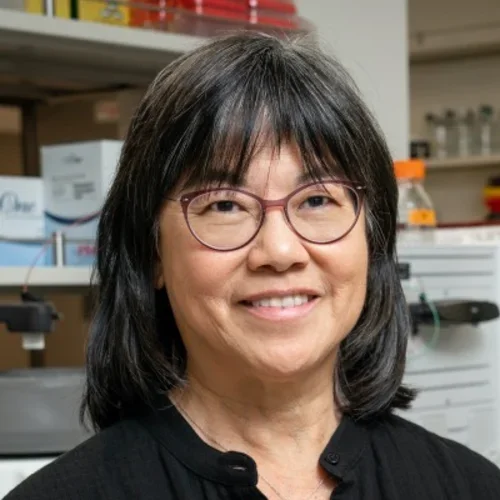
About
4345 CNSI (office)
4324 CNSI (lab)
Anna M. Wu, Ph.D, is Research Professor, Department of Molecular and Medical Pharmacology, David Geffen School of Medicine at UCLA, Los Angeles, CA. She is Professor and Chair, Department of Immunology and Theranostics and Co-Director, Center for Theranostic Studies, at the Beckman Research of the City of Hope in Duarte, CA. She was a Professor in DMMP from 2002-2018. While at UCLA she also held positions as Vice Chair, DMMP, Co-Associate Director, Crump Institute for Molecular Imaging, and Director, Cancer Molecular Imaging Program, Jonsson Comprehensive Cancer Center. She is a past Chair of the California Breast Cancer Research Council, and Fellow and Past President of the World Molecular Imaging Society. Dr. Wus research interests include engineered antibodies and proteins for targeting, imaging, and therapeutic applications in cancer and immunology, including the use of SPECT, PET, optical and multimodality approaches. More recently her focus has included clinical translation of targeted radiopharmaceuticals for imaging and therapy in cancer. Dr. Wu is the Co-Founder and Chief Scientific Advisor to ImaginAb, Inc., which develops and commercializes engineered antibodies for clinical imaging in cancer and other diseases. Dr. Wu received her A.B. degree in Biochemical Sciences from Harvard University, and a Ph.D. from Yale University in Molecular Biophysics and Biochemistry. Postdoctoral studies were conducted at Yale University and at the University of California, San Francisco.
Research Description:
Dr. Wu’s research focuses on applications of antibodies to cancer diagnosis and therapy, utilizing engineered antibodies for targeted radionuclide delivery. Her group initially produced engineered chimeric and fully humanized antibodies for radioimmunotherapy of colon and breast cancer. She also pioneered engineered antibody fragments such as diabodies/cys-diabodies (55 kDa) and minibodies (80 kDa), allowing full control over size, valency, pharmacokinetics, tissue penetration, and organ of primary clearance, for imaging or targeted therapy. Her lab has produced engineered fragments recognizing numerous cell-surface targets in cancer (CEA, HER2, CD20, EMP2, PSCA, PSMA, and others). These have been coupled with positron emitting radionuclides including I-124, Zr-89, Cu-64 and F-18 for immunoPET, or hard beta emitters (I-131, Y-90, Lu-177) for radioimmunotherapy. Recently, work has been extended to immunoPET imaging to key immune cell subsets, directly imaging CD4-, CD8-, or CD20-expressing lymphocyte populations in vivo using Zr-89, Cu-64, and F-18 labeled minibodies or diabodies. These have been used to visualize infiltration of cytotoxic CD8 T cells in models of cancer immunotherapy, and expansion of CD4 T cells in lymphoid tissues and colons of mice with colitis. A recent highlight is the completion of a Phase I immunoPET study and initiation of Phase II imaging of CD8 cytotoxic T cells in patients on checkpoint inhibitor therapy using an 89Zr-Df-anti-CD8 minibody. A major current focus is engineering and clinical translation of anti-tumor antibodies for targeted radionuclide therapy in cancer.
Education and Degree(s)
- Ph.D. from Yale University in Molecular Biophysics and Biochemistry
- A.B. degree in Biochemical Sciences from Harvard University